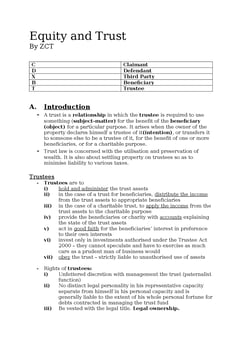Mcphail v Doulton [1971] AC 424; 1970 UKHL 1
Judgement for the case Mcphail v Doulton
Table Of Contents
KEY POINTS
-
In a discretionary trust, Trustees have flexibility in choosing beneficiaries and deciding on distributions.
When Trustees "shall" apply income but are not bound to exhaust it, they must still consider distribution, though they can retain some income for future use.
This setup still constitutes trust, not just a power, because trustees have an obligation to act, even if with discretion.
Accumulated income can be applied later, respecting the trust's terms and legal rules, like the rule against perpetuities.
A discretionary trust with the power to retain and later apply income remains a trust if there's a duty to act and an obligation to consider distribution.
The trust's validity depends on meeting legal requirements and clearly defining the trustees' duties and beneficiaries' rights.
FACTS
-
Bertram Baden ("Settlor") created a trust fund for the benefit of a company's staff, their relatives, and dependants.
The Trustees had the power to distribute the fund's income at their discretion but were not required to exhaust the income every year and could accumulate or invest it. They could also use accumulated income or capital to provide benefits.
The Settlor's executors claimed the trust was void and sought to reclaim the fund for the estate. The trustees, seeking clarification, went to court.
Goff J. ruled that Clause 9(a) was a power, not a trust, and therefore valid.
-
The Court of Appeal upheld Goff J.'s decision but noted that he applied the wrong test for the validity of powers.
They referenced the correct test from the House of Lords in In re Gulbenkian's Settlements and remitted the case to the Chancery Division for further consideration.
Robert Thomas Mitchell McPhail, Enid May Baden (widow), and Raymond Rostron Baden, ("Executors") appealed this decision.
JUDGEMENT
-
The appeal was allowed with following points:
Clause 9(a) of the trust deed was determined to be a trust, not a power. Consequently, the case was sent back to the Chancery Division to assess whether Clause 9 was valid or void, considering section 164 of the Law of Property Act, 1925.
-
Despite dissenting opinions from Lord Hodson and Lord Guest, the standard for evaluating the validity of trust powers followed the test from In re Gulbenkian's Settlements.
This test established that trust was valid if it could be determined with certainty whether any given individual was or was not part of the designated class.
-
Lord Reid, Viscount Dilhorne, and Lord Wilberforce suggested that while the validity test for trust powers and powers was aligned, it didn't imply complete equivalence between the two.
In cases of trust powers, if Trustees failed to exercise their discretion, the court could intervene to fulfill the Settlor's or Testator's intentions.
This was in contrast to ordinary powers, where the court would only intervene in cases of abuse or capriciousness.
The Court of Appeal's decision was reversed.
COMMENTARY
This case highlights the balance between discretionary trusts and the powers vested in Trustees, elucidating principles of trust law.
-
The initial setup of the trust, as outlined in the facts shows the inherent flexibility granted to Trustees in discretionary trusts.
Trustees possess the discretion to select beneficiaries and determine distributions, with the understanding that they have an obligation to act within the trust's parameters, even if exercising discretion.
The concept of accumulating income for future use, while adhering to legal frameworks like the rule against perpetuities, underscores the enduring nature of trust.
-
The judgment reads the importance of accurately categorizing provisions within trust deeds, distinguishing between trusts and powers.
The determination that Clause 9(a) constituted a trust, not a power, shows the role of the Chancery Division in evaluating the validity of such clauses.
Moreover, the alignment with the test established in In re Gulbenkian's Settlements emphasizes the need for precision in assessing the membership and scope of designated classes within trusts.
The reversal of the Court of Appeal's decision shows the meticulous scrutiny applied to trust instruments, ensuring alignment with legal standards and the intentions of the Settlor.
This case serves as a reminder of the relationship between discretion, obligation, and judicial oversight within the realm of trust law.
For Further Study on Mcphail v Doulton
Need instant answers? Our AI exam tutor is here to help.
Ask questions 🙋 Get answers 📔 It's simple 👁️👄👁️
Our AI is educated by the highest scoring students across all subjects and schools. Join hundreds of your peers today.
Get StartedSimilar Cases
Related Product Samples
These product samples contain the same concepts we cover in this case.

